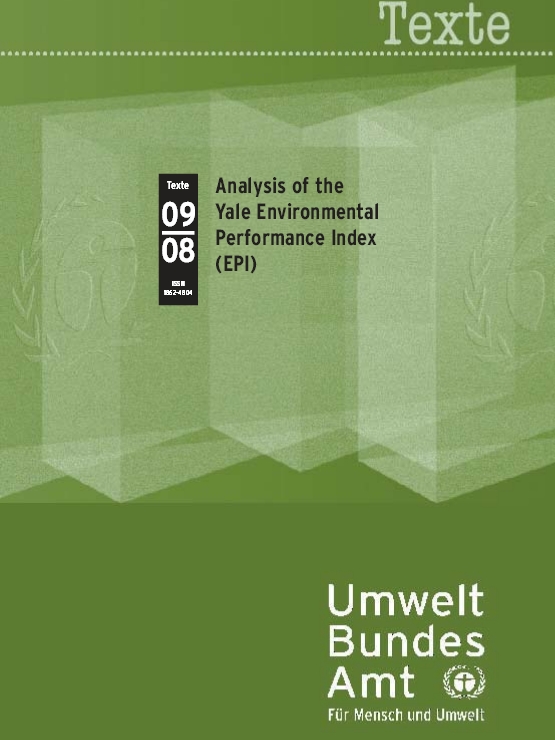The Environmental Performance Index (EPI) identifies targets for several core environmental policy categories and measures how close countries come to meet them. Ecologic conducted a stocktaking and analysis of the data sources of the EPI for Germany, complemented by an assessment of the applied method and methodologies of the Index. Based on this assessment, both the scientific and political relevance of the index for German Environmental Policy performance were determined.
The Environmental Performance Index (EPI) is a research project aiming at establishing an international composite environment index. It is jointly implemented by two US-Universities (Yale/New Haven and Columbia/New York) and has been commissioned by the World Economic Forum/Davos. The research project attempts to facilitate quantitative cross-country comparison of the environmental performance of countries with the objective of enhancing conditions of success for environmental policies. It further strives to complement the environment indicator set of the United Nations Millennium Development Goals.
The EPI identifies scores/targets for several core environmental policy categories and measures how close countries come to meet them. In addition to publishing the composite index and individual country scores, a country ranking is released. The most recent publication of the Pilot-EPI (2006) has placed Germany in the 22nd position, which compares to a lower rank among Industrialised Countries. This study has traced the individual results for Germany, based on an analysis of data sources and data quality as well as an assessment of the underlying methodology of the composite index. As part of this assessment, the scientific validity of the ranking has been investigated.
Regarding the relevance of the EPI for adequately assessing German environment politics and policies, a number of pivotal factors could be singled out. These include the selection, conceptualisation and weighting of individual indicators, the data quality and the policy scores. The selection and weighting of certain policy scores and indicators has been driven by the claim to complement the environment indicator set of the United Nations Millennium Development Goals. Accordingly, the selection reflects above all truly global environmental problems with widespread significance. However, such selection and weighting does not mirror sufficiently the specific dimensions of environmental problems typical for industrialised countries and therefore, reduces significantly the explanatory power of the EPI for Germany.
The low number of indicators as well as the partly low data quality does not permit to capture and assess the environmental performance of a country in its entirety. The selected indicators do not reflect the pivotal environmental problems in a number of policy areas, which are of high concern for a heavily industrialised country such as Germany. This includes in particular environmental problems with a strong quality dimension (for example, access to sanitation is less of a concern compared to the quality of sanitation and sewage treatment). Furthermore, the data sources for some indicators are unclear, the indicator methodology differs significantly from standard national conceptualisation (e.g. Regional Ozone) and in some cases, the results of some indicator conceptualisations are not scientifically sound (e.g. agricultural subsidies).
There are already a number of existing regional cross-country indicator sets of International Organisations (OECD, EU EEA), which offer methodologies that are more scientifically sound and have a higher explanatory power in assessing the environmental performance of Germany.
At this point in time, it cannot be conceded that the claim to establish an analytically sound quantitative composite index has been achieved. The explanatory power of the cross-country comparison for Germany is low due to significant and obvious methodological deficiencies and problems of the composite index. However, the remarkable political and media attention, which has been generated by the Environmental Performance Index within a short period of time, has an important positive aspect. This public exposure is helpful to identify more entry points to initiative substantive debates on cross-country data sets in the environment field at the international level.
The project report was now published by the German Federal Environment Agency in UBA-Texte 09/08 and is available for download.




